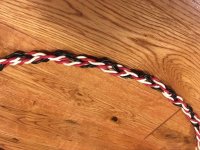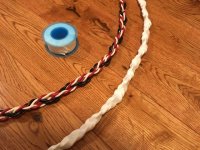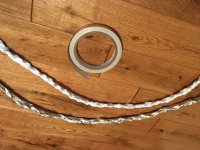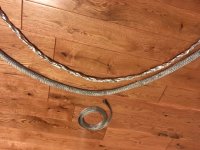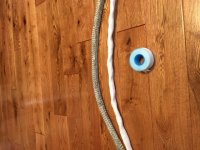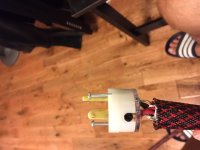Is there anything other than basic best practices to consider when making power cables? Just want to make sure I don't start a fire due to overlooking something. Thanks.
Here are the steps I took (no fire yet lol):
I used 2 X 18 awg stranded hookup wire for each conductor.
Twisted and braided.
Two wraps of PTFE tape.
A wrap of foil tape.
Braided shield.
Two wraps of PTFE tape.
Braided outer sleeve.
The braided shield is grounded at wall receptacle end.
I used Marinco connectors on both ends.
Here are the steps I took (no fire yet lol):
I used 2 X 18 awg stranded hookup wire for each conductor.
Twisted and braided.
Two wraps of PTFE tape.
A wrap of foil tape.
Braided shield.
Two wraps of PTFE tape.
Braided outer sleeve.
The braided shield is grounded at wall receptacle end.
I used Marinco connectors on both ends.
Last edited:
I updated my post with the steps I took. And here are pics. By "best practices" I suppose I mean "don't do anything stupid" lol.
Attachments
OK -I'm boring. But I'll say it anyway. If you need a power lead, use wire designed and built specifically for that purpose and forget about this braiding, twisting and taping business. Better still, just buy one off the shelf, then you don't even need to wire up the connectors. Quality power leads are inexpensive, and when purchased from a reputable manufacturer, safety is assured & your home insurance will be unaffected. If you need a shielded lead to prevent interference in other components, reasonably priced examples exist.
Do you also intend to replace your electrical house installation with cables like these?
Best regards!
No. Why?
OK -I'm boring. But I'll say it anyway. If you need a power lead, use wire designed and built specifically for that purpose and forget about this braiding, twisting and taping business. Better still, just buy one off the shelf, then you don't even need to wire up the connectors. Quality power leads are inexpensive, and when purchased from a reputable manufacturer, safety is assured & your home insurance will be unaffected. If you need a shielded lead to prevent interference in other components, reasonably priced examples exist.
Well, none of what I've done is expensive. Yes, I can buy a power cable. But the fun is in doing it yourself - I'm on the right forum for that right lol? And if I don't do the twists and braids, half the fun is gone.
Well, what's the use in twisting, taping and shielding power cables at all, especially if the bigger part by far of the total length remains untwisted, unshielded and untaped?No. Why?
Security concerns have been covered yet…
Best regards!
Working in the IT department of a university helps a stack. Our network equipment comes standard with British or European power cables (IEC one end UK Standard/Schuko the other.) However we use intelligent PDUs with IEC C14 to C15 connectors. The extra cables are discarded; I bought a whole bunch of them for use with my equipment. Good high quality heavy duty cables. Can even buy the UK or Schuko sockets here and make my own power strip in a piece of trunking. Can even put a filter inline with the input feed. And on I go. Relatively inexpensive. Nothing fancy needed. I have two such power strips each from a seperate CB. One for the components (CDPs, PreCD-DAC, RIAA, turntable and one for the power amps.
Well, what's the use in twisting, taping and shielding power cables at all, especially if the bigger part by far of the total length remains untwisted, unshielded and untaped?
Security concerns have been covered yet…
Best regards!
I see where you're going with this. And that's not the point of my post. I have not brought up real or perceived sonic benefits. I don't actually expect any. I'm doing this for FUN. Because I enjoy making stuff. So back to my question: is there some safety precaution I'm missing or breaking?
Power leads are always a potential fire hazard, so yes. If you are using wire not designed / intended for that purpose, then introducing further unnecessary potential mechanical stresses by braiding a bunch of those wires together, you are increasing the risk relative to using something that was designed and built for this role. There's a reason insurance companies like power-delivery to be via certified components. Entertainment is good, and the risk may be small depending on the competence of the builder, but if you really want to make a power lead, I'd strongly advise using materials designed for purpose.
Of course, thanks God you are not pursuing that, but a real practical use. Good.I have not brought up real or perceived sonic benefits. I don't actually expect any.
That´s the problem.I'm doing this for FUN. Because I enjoy making stuff. So back to my question: is there some safety precaution I'm missing or breaking?
Commercial power cable manufacturers make a living out of making them and nothing else, so are very experienced, have then proper materials and test equipment, but most important point, KNOW their product MUST be certified by the approppriate Government Labs to comply.
Sadly, as a Hobbyist, you are not.
I am all for DIY making everything, but in this particular point, safety, I´d rather buy officially tested and approved stuff, THEY have sent their stuff for testing and came back with a seal of approval.
You have not.
Hey, your power cables may work very well, that´s not the point.
Personally, if needing some special power cable, say in a custom length (which in fact happens), I´d simply buy a roll of standard power cable from an electrical supply shop, and connect it to a couple commercial connectors, bought from the same source.
No special operations such as twisting, shielding, etc, just needed soldering or screw attaching, maybe some heatshrink tubing when exiting each connector to reinforce the "neck" where most flexing happens.
but in this particular point, safety, I´d rather buy officially tested and approved stuff
Gotcha. Thanks. I suppose I'll buy some wire designed specifically for AC and throw my sleeve and ends on it.
I think there is. Your twisted cable looks single insulated where double insulation is required. And I do not believe that your taping is accepted additional insulation.I see where you're going with this. And that's not the point of my post. I have not brought up real or perceived sonic benefits. I don't actually expect any. I'm doing this for FUN. Because I enjoy making stuff. So back to my question: is there some safety precaution I'm missing or breaking?
It comes recommended: Belden 19364 mains cable | Hifi CollectiveOne more quick question: the Belden 19364 appears to be legit for this purpose. What do you guys think?
Hello,
If you really want above average IEC power connectors, look at suppliers like didikey or whoever for hospital grade rated ones. They have better than average connections and materials and are tested. Come with a green dot on them showing the rating. Prices are quite reasonable.
They can be bought for sure in 18 gauge to 12 gauge. The 12 gauge ones are hard to find, but there are a few out there.
Of course not as pretty as gold plated, fairy dust encrusted ones, but work quite well.
If you really want above average IEC power connectors, look at suppliers like didikey or whoever for hospital grade rated ones. They have better than average connections and materials and are tested. Come with a green dot on them showing the rating. Prices are quite reasonable.
They can be bought for sure in 18 gauge to 12 gauge. The 12 gauge ones are hard to find, but there are a few out there.
Of course not as pretty as gold plated, fairy dust encrusted ones, but work quite well.
- Status
- This old topic is closed. If you want to reopen this topic, contact a moderator using the "Report Post" button.
- Home
- General Interest
- Everything Else
- DIY Power Cables
